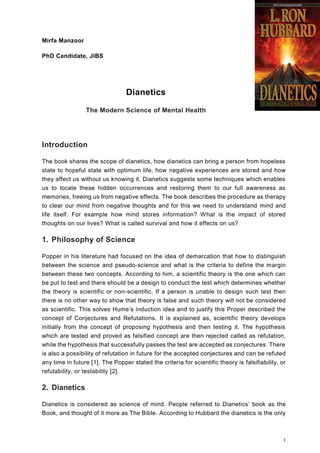The Greatest Guide To Dianetics
Wiki Article
Some Known Details About Dianetics
Table of ContentsDianetics Can Be Fun For EveryoneThe Only Guide to DianeticsThe Of DianeticsThe Greatest Guide To Dianetics
I could not ever not wish to get anything that enters your mind for you- if it was otherwise, I would not be sitting below with you, doing this. I not just could never ever have a problem, or not intend to hear something that comes to mind for you, however I'm completely anxious to know every idea, every idea, every image or sensation that arises or materializes for you- don't ever believe or else, and if for some factor you do, please just allow me know! In some cases, you might have a thought, and picture, idea or occurrence pop up that does not seem to respond to the concern, or relate to it, but nevertheless, always do inform me concerning it, and as we proceed, the importance will certainly emerge for you.This is integral in the basis of handling, and the subject of this discussion: the basic duties of the therapist and the client: The standard duty of the counselor is, unlike "typical training", not to manage, which means to enforce and/or hinder, however to rather function from the basis of EMPOWERING THE CUSTOMER.

The Definitive Guide to Dianetics
John Mcmasters expressed this basic reality incredibly well in one of his talks on Power processing, where he discusses exactly how he was asked what this "special flair" was that he had for offering such fantastic sessions; he had to assume regarding that for a moment, and detected that it was what he had not been doing, as well as what he was doing: he wasn't assessing, evaluating, computing, or actually, producing any type of ideas, not to mention spoken expressions, after providing the command and while waiting on the PC to complete their solution to their contentment; he was, just and only, being existing with the computer, and totally interested.The function of the therapist, showed; that was his "special knack". I have actually had my very own experience which taught me this well, really early in the game. In 1982, having actually recently finished my training and internship on New Era Dianetics, I was running this on a COMPUTER, and there was a point in the session where (being a little more bit wet behind the ears not yet having numerous hours under my belt as a specialist auditor) the computer appeared to be "taking too lengthy" to share anything verbally after I offered him a command.
This secret transformed out to be the most beneficial payment that John ever made to the official source topic of treatment or bookkeeping (Dianetics). In my humble opinion, it is the best contribution that anyone has actually ever before made to these subjectsthe application is totally non-judgemental, non-evaluative, and devoid of any type of tip, guidance or opinion.no preconditioned agenda for people, or 'levels' that they need to do
In Idenics, the only resource of details regarding a client is the individual customer. In Scientology we prided ourselves on not reviewing for people. All that truly indicated was that the auditor did not Vocally evaluate for the Computer in session. The registrars and ethics police officers examined for the PC.
A Biased View of Dianetics

Anybody who had ever seen John audit might not assist however observe an unique quality in his auditing."The client's standard duty is to be there with the purpose of moving in the direction of their spiritual goals, and to openly and fully reveal and experience whatever shows up for them in addressing the inquiries and performing the instructions in the processing.
This is something to process as required. Yet additionally, people regularly have previous experience and/or brainwashing in auditing/processing which, somehow, and to some extent, actually misguides them right into mindsets, ideas and behavior patterns that protect against the complete awareness of these roles, and so they will tend to hinder the expressing of what comes to mind, as in the examples provided above. * The very first, and perhaps foremost examples of mis-indoctrination leading to much less than completely smooth and reliable sessions, can be discovered in particular aspects of the training routines, or "TR's":"TR's" are commonly a person's first, or at the very least early, experience in Scientology, and while I will certainly take place to clarify what I see view as the defects in idea and technique, nevertheless, tend to be significantly therapeutic, done as they are provided (Hubbard insists that "TR's are not processing, they are educating", but factually, they are both handling AND training)
There is no "flunking", and no denial of the reality of this being processing. The emphasis, as it ought to be, is on experiencing the various other person's presence.
Not known Details About Dianetics

Report this wiki page